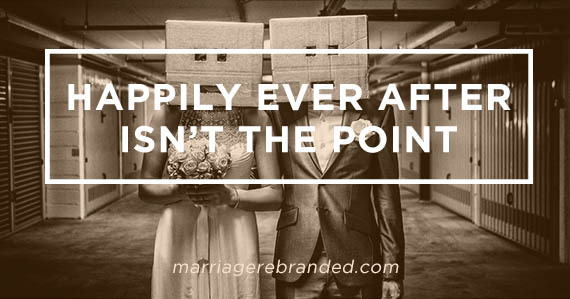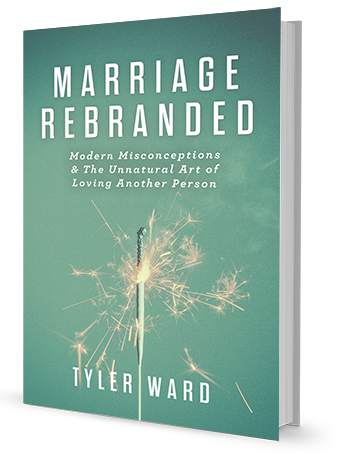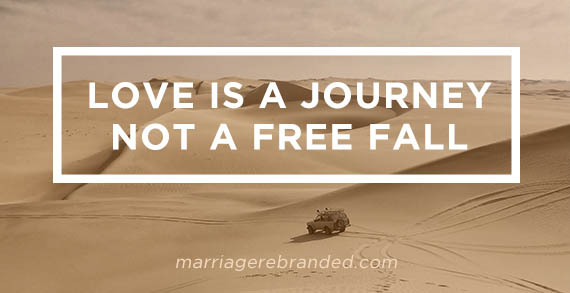
I can feel the veins in my neck bulging.
The veins in my neck never bulge. I'm the guy who internalizes everything -- no matter how much the circumstance warrants a reaction (for better or worse).
The more she explains how my negligence in our relationship makes her feel, the more I want to jump in my truck and spend the weekend alone on the open road -- neglecting our relationship.
Instead, we resort to our increasingly popular nightcap. I walk out, slamming the door behind me for dramatic effect. She crawls under the covers, in tears -- but not before setting up her wall of pillows down the middle of the bed, just to remind me, when I do come to sleep, that things are not okay.
We were 18 months in and though our first year was bliss, pillow walls were now becoming our norm.
We weren't supposed to be the ones in a perpetual fight.
We were the couple who highlighted and dog-eared our marriage books. My wife was still my dream. Yet, something was missing. We both felt it. And we both wondered why.
As we explored the growing deficiency, we kept coming back to a handful of misconceptions we brought into our marriage. Our growing frustrations. Our screaming matches that were becoming ritualistic. Our doubts. They all could be traced to our misguided ideas about marriage and their inability to support the very unnatural art of loving another person.
Needless to say, a little foresight could have saved us a couple of hard nights early on in marriage. So in lieu of slammed doors and pillow walls, here are three things everyone needs to know before they marry.

1. HAPPILY EVER AFTER ISN'T THE POINT.
As soon as we're able to understand bedtime stories, Cinderella and her friends tell us love is about happiness. Hollywood eventually takes up Cinderella's campaign, inundating us with the idea that marriage -- and sex -- is our gateway into happily ever after.
But what if I told you happily ever after isn't the point?
It doesn't take long into matrimony for most of us to realize Disney and Hollywood were full of it. At that point, our frustration with Cinderella is only rivaled by the disillusionment we feel in our marriages.
Our modern obsession with being happy often makes it far more natural for us to love happiness more than we ever love another human. And though being happy is a very real by-product of a healthy relationship, the value we put on personal happiness is so inflated, its causing us to miss one of the more beautiful purposes of marriage. The ancient Hebrew culture, on the other hand, didn't seem to miss this purpose. The language even highlights and unpacks this ideal for us.
In Hebrew, the word used for marriage actually means "Fire." And not-so-coincidentally, fire is also the element used throughout ancient Hebrew culture to represent personal reformation. In this light, marriage (and its necessary friction) is seen less as a doorway to happily ever after and more as a tool in divine hands to help us become increasingly beautiful -- increasingly our best and brightest selves.
2. GOOD CONSUMERS MAKE BAD LOVERS.
I couldn't wait to get married. Of course, I loved my wife and couldn't see my future with anyone else. Yet I was mostly looking forward to the perpetual slumber party, saying goodbye to the awkwardness of singlehood, and (obviously) the endless, mind-blowing sex.
And with that, I became a perfect illustration of another misguided modern mentality towards marriage.
Many of our ideas of love lead us to, consciously or subconsciously, begin and end the conversation with what marriage can do for us. Sadly, this me-centricity has a way of neutering the beauty of marriage -- taking a relationship designed for giving and making it all about getting.
- It's taking out the trash.
- It's actively choosing to give him space when he is stressed.
- It's a text message, mid-afternoon, to tell her you can't stop thinking about her.
- It's the choice to not react to something he said, but asking what he meant and how it makes him feel, instead.
- It's the time you're late for a meeting, but run back inside to tell your wife -- who you know adores being told -- how much she means to you that day.
- It's the painful routine of taking the 3:00 a.m. newborn feeding shift so your wife can finally have three hours of uninterrupted sleep.
3. LOVE IS A JOURNEY -- NOT A FREE FALL.
"We fell in love and got married."
This was certainly my story. After a few stomach butterflies and a handful of DTRs (Define the Relationship), I thought my wife and I had arrived at the much-sought-after phenomenon of being in love. It was no wonder I expected all the benefits of love on Day One of our marriage.
You know the benefits I'm talking about. The trusted friendship. The happy partnership. The ongoing romance.
But anyone who has experienced marriage knows that though these benefits are very real perks of love, they don't come for free.
- Trust requires trust-building circumstances over time.
- True companionship comes from years of conversation.
- And romance? Well, the kind of romance that doesn't fade only comes from being intentional over the long haul.
Many of us get married and immediately expect to reap the rewards of love and quickly learn that true love isn't something we fall into. This state of "Love" (and all of its benefits) is developed over years of learning to relate to one another -- it's a journey.
A friend of mine recently attended a small gathering after a frustrating fight with his wife. As they went around the circle introducing themselves, he announced they had been married five years. A woman, almost cutting them off, blurted out, "five years? Oh, you guys are only kindergarteners."
Suddenly, my friends frustrations with his marriage disappeared. As he thought about the woman's simple but profound comment, he realized: everybody expects kindergarteners to occasionally act childish, be selfish, and throw tantrums. Perhaps he should cut himself and his wife some slack in his marriage.
We can't expect to microwave love, and can't assume our spouse or our marriage will offer all the benefits of love on Day One.
Marriage, with its everyday equation of radical proximity to another human is never going to fit nicely into our neat boxes of formulas and principled ideals. I get it. And, regardless of what we know before we get married or not, it is always going to have a way of stretching us -- many times to the brink of wanting to give up. But perhaps with every misguided idea about marriage we replace with a more timeless one, the more natural the very unnatural art of loving another person becomes.
____________ Tyler Ward recently released "Marriage Rebranded: Modern Misconceptions & the Unnatural Art of Loving Another Person," where he explores more modern myths about marriage, tells awkward stories, and offers unorthodox best practices that are sure to help anyone write a better marital narrative for themselves. Pre-order it here. Or get more info here.
Tyler Ward recently released "Marriage Rebranded: Modern Misconceptions & the Unnatural Art of Loving Another Person," where he explores more modern myths about marriage, tells awkward stories, and offers unorthodox best practices that are sure to help anyone write a better marital narrative for themselves. Pre-order it here. Or get more info here.

